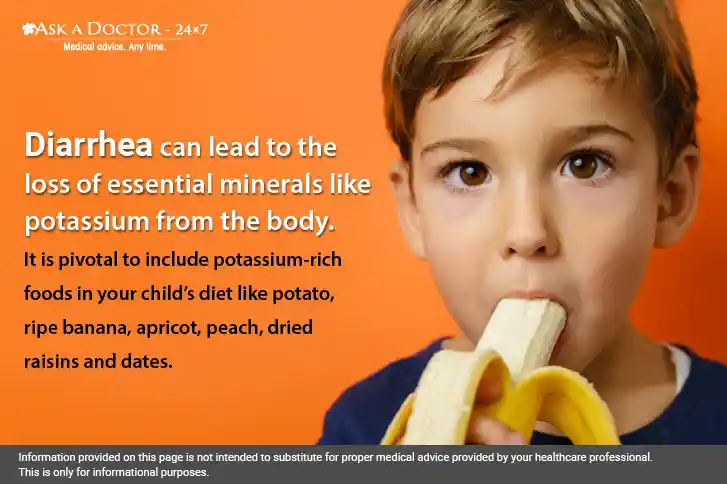Home Remedies To Reverse Diarrhea In Children And Infants
The only thing that can slow down a child's fun is an upset stomach with frequent soft or loose bowel movements (poop) or diarrhea. Unfortunately, infants and children get troubled quite frequently but the good news is that most acute diarrhea cases get easily managed with effective home remedies along with prescribed medications, in certain cases.
Here in this article, our expert has jotted down some easy and effective home remedies to control loose motions in kids. But before getting on the remedies, let us understand the types of diarrhea and some common causes of loose motions or diarrhea in kids and infants. Read on…
What are the Types of Diarrhea?
Diarrhea can be of two types:
Short-term (acute) - This type of diarrhea or loose watery stool lasts 1 or 2 days to up to a week, then goes away. Usually, it is caused due to the intake of food or water that is contaminated by bacteria (bacterial infection). It may also occur if your child gets sick from a virus.
Long-term (chronic) - When diarrhea lasts for 3 weeks or more it is called chronic diarrhea.
Why Happens in Diarrhea?
Loose motion or diarrhea is the result of excessively watery stool that the large intestine is unable to adequately absorb, leaving the stool fluid loose. It is the body’s method of removing bacteria, viruses, or toxins from the gastrointestinal system. Sometimes loose stool is a transient issue that goes away on its own without the need for medical intervention. Let us explore effective home remedies for loose motion treatment at home.
What are the Causes of Acute and Chronic Diarrhea in Kids?
Below are the causes of diarrhea in kids, based on the type of diarrhea:.
Causes of Acute Diarrhea
Infections that are mentioned below are the most common cause of acute diarrhea:
- Viral gastroenteritis: Rotaviruses and noroviruses are some of the most common causes of acute diarrhea in children. Those who attend daycare or preschool are mostly affected.
- Bacterial infection: Infection in the intestines, such as salmonella or E. coli., can cause bacterial infection diarrhea.
- Parasite infection: Although less common, parasites such as giardia can also cause acute diarrhea.
Causes of Chronic Diarrhea
The cause of chronic diarrhea that last several weeks in kids include:
- Toddler's diarrhea: It is often caused due to dietary reasons like excess fruit or juice. Children with the condition usually face mild diarrhea for weeks. Despite this, they eat well, grow normally, and don’t have other symptoms.
- Cow's milk protein allergy: An allergy to cow's milk protein also leads to diarrhea, particularly in the infancy stage. Other symptoms observed with this type of diarrhea include trouble feeding, poor weight gain, and blood-streaked diarrhea.
- Antibiotic-associated diarrhea: Antibiotics that treat harmful bacteria may also destroy helpful bacteria. This in turn affects the normal balance of bacteria in the gut, thus leading to diarrhea.
- Lactose intolerance: If a child has difficulty digesting lactose, a sugar found in dairy products, s/he might face chronic diarrhea issues.
- Food allergies: An allergy to certain foods can also lead to diarrhea. Other symptoms of a food allergy might include poor weight gain, rashes, and other gastrointestinal symptoms.
- Inflammatory bowel disease (IBS): Conditions like ulcerative colitis or Crohn's disease can lead to inflammation and diarrhea. Your child may also have mouth sores, poor growth, and weight loss if they have IBS
- Irritable bowel syndrome: This condition is more common in adolescents and can cause intermittent diarrhea.
Alongside the above reasons, there is another autoimmune condition called celiac disease that may cause chronic diarrhea in children. Children who have gluten intolerance and other autoimmune conditions or a family history, usually develop celiac disease.
Home Remedies To Control Loose Motions in Children and Infants

Natural home remedies that can help you feel better if you have diarrhea and loose motion:
1) Hydration is the Key
Diarrhea can result in significant fluid loss, so give your child enough fluids to prevent dehydration. At-home remedies to stop your child’s diarrhea should focus on keeping your child hydrated as well as offering a variety of nutrients. Do not give your child fruit juice, energy drinks, or soda which can further cause loose motions. The fluid options to include are as follows:
- Water
- Breast milk/formula milk in infants
- Coconut water
- Lemonade
- Pediatric electrolyte solution
- Vegetable broth or soup
- Red lentil soup
Always remember that compared to electrolyte solutions, breast milk contains more nutrients and is easily digested by breast-fed children.
2) BRAT Diet
The abbreviation "BRAT" stands for the following foods that are part of the diet:
B-> Banana (mashed for infants)
R-> Rice
A-> Applesauce
T-> Toast
Consuming the BRAT diet focuses on easy-to-digest, bland foods that are gentle on the stomach and reduce symptoms of a digestive illness. Also, BRAT food items do not cause nausea or vomiting in children.
3) Yoghurt
One of the best home treatments for loose movements in babies and young children is yogurt. It contains a lot of probiotics, which are living microorganisms that support intestinal health and help prevent diarrhea. Yogurt prevents dehydration and is good for the digestive system.
Different curd recipes that are beneficial in loose motions:
- Curd served with rice.
- Buttermilk is made by adding water to the curd and blending it using a whisker. You can also add cumin powder and salt for taste.
- Curd with banana
- Fenugreek water
Owing to its antibacterial and antifungal qualities, fenugreek seeds are a popular at-home remedy for loose motion and stomach pain. Two teaspoons of dried fenugreek seeds should be boiled in two cups of water until it turns into one cup. The liquid can be sieved and given to the children. It is good at reducing the symptoms and discomfort associated with diarrhea as fenugreek water soothes the digestive system.
5) Sago water
Sago is another effective home remedy for treating loose motions and improving digestion. Sago should be properly boiled and strained. The water can be given to the babies. For older children, sago can be cooked in a pan with salt and herbs. Sago aids in the retention of fluids in the intestines, which helps to manage recurrent diarrhea and thicken loose stools.
6) Serve more of starchy foods
If your little child has begun eating solid or semi-solid foods, you can make them feel better by giving them rice cereal or potatoes to aid with diarrhea symptoms. After boiling, thoroughly mash the potato and sprinkle with salt. This can be given to your infant at least once a day.
When to Consult a Doctor for Loose Motions in Children and Infants
You must consult a doctor if your child:
- Is younger than six months as there is a higher risk of dehydration.
- Diarrhea that is not improving after two or three days.
- Shows symptoms of dehydration (poor urine production, no tears, no spit in the mouth, excessive body tiredness with little energy level)
- Has stomach pain and blood in the stool.
- Is throwing up and can’t keep any fluid down.
- Has a high temperature that doesn't go down when taking medicine for fever.
- Has an enlarged or swollen abdomen.
- Had undergone any abdominal surgery in the past.
Hence, the home remedies listed above have the potential to reduce diarrhea symptoms and expedite the healing process for loose stools in children. Make sure that your child gets sufficient rest and try to feed them more liquids. It's important to keep in mind that your baby has a very delicate digestive system so if diarrhea continues, seek professional medical assistance.
If you have any questions regarding loose motions in your child or related symptoms, you can check with our expert Gastroenterologist at Ask a doctor, 24x7.
Recently Answered Questions Related to Diarrhea and Gastroenteritis
- What Type Of Diarrhea Am I Having?
- Does Ferosoft FA Cause Diarrhea?
- Suggest Diet For Inflamed Stomach Lining
- What Causes Diarrhea And Vomiting?
- Could Mouth Ulcer Be Due To Diarrhea Medication?
- What Causes Tarry And Sticky Stools Along With Bright Orange Mucus Discharge In Stools?
- Suggest Treatment For Home Remedy For Gastroenteritis
- How Long Does Gastroenteritis In A Diabetic Take To Recover?
- Why Does My Child Have Loose Stools After Gastroenteritis And Viral?
- How Can Diarrhea And Nausea Be Treated While On Antibiotics For Cellulitis
Disclaimer: Information provided on this page is not intended to substitute for proper medical advice provided by your healthcare professional. This is only for informational purposes.
Ask a Specialist
Recent Questions


